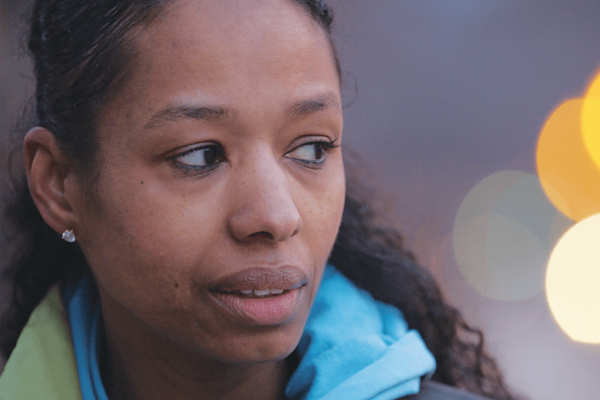IN THEORY, FACULTY with tenure have safety to pursue academic freedom, but four years ago Dr. Larycia Hawkins, then an associate professor of political science at Wheaton College, exposed the reality that for women of color tenure is vulnerable, even to online trolls. When Hawkins became the center of a national controversy over a Facebook post expressing solidarity with Muslim women during a wave of anti-Muslim rhetoric sweeping the nation, her employer did not protect her. Instead, it hung her out to dry. Now Hawkins is at the center again, this time as the subject of the documentary film Same God, directed by Wheaton alumna Linda Midgett.
Wheaton, an elite evangelical liberal arts school in the Chicago suburbs, touts a proud abolitionist past as a stop on the underground railroad and the first institution of higher education in Illinois to admit a black man. “Doc Hawk,” as Hawkins’ students lovingly call her, was celebrated as the first African American woman to receive tenure in the school’s 159-year history.
Same God begins in the aftermath of the mass shooting on Dec. 2, 2015, in San Bernardino, by a Muslim couple influenced by Islamic extremism. Barack Obama was president and Donald Trump was on the campaign trail, promising a ban on all Muslims entering the country. Two days later, Jerry Falwell Jr. escalated tensions from a stage at Liberty University. “I’ve always thought if more good people had concealed carry permits, then we could end those Muslims before they walked in and killed us,” he said, after cavalierly asking the cheering audience if it was illegal to pull out the weapon he hinted was in his back pocket.
On the same day that The Washington Post published an open letter to evangelical leaders by students at Wheaton condemning Falwell Jr.’s comments, Hawkins also spoke her conscience in a Facebook post that quickly spun out of control. There, she announced that she would don a hijab during Advent, as an act she calls “embodied solidarity.” Her post began, “I stand in human solidarity with my Muslim neighbor because we are formed of the same primordial clay,” and cited the pope, who, earlier that week, had said that Muslims and Christians worship the “same God.” Within 48 hours, the evangelical community had erupted.
Absent of context, Hawkins was portrayed as a heretic by right-wing evangelicals, including Franklin Graham, son of Wheaton alumnus Billy Graham. “Can you believe this Wheaton College professor?” he said. “Shame on her!” In the rush to do what many institutions do in a PR crisis, Wheaton sought to protect its reputation with powerful donors. Hawkins was placed on administrative leave just before giving a final exam and asked to answer to the administration’s areas of concern. But the questioning of her commitment to the school’s statement of faith turned into an inquisition. In the end, she lost her job but gained a cloud of witnesses, including students and fellow faculty.
The near impossibility of having nuanced discussions about politics and religion on social media soon became clear. After showing for and against camps forming online among Wheaton alumni, Midgett dared to ask a tough question that is central to the film. She maintains that the film is not about Wheaton: “It’s a documentary about what is happening within evangelicalism. I was questioning if evangelicals even worship the same God.”
The re-centering of the narrative around Hawkins reveals not just what happened but also who she is, both spiritually and politically. The film takes the audience inside Hawkins’ childhood home in Oklahoma City. We meet her family and the church founded by her grandfather, which was vandalized with a racist slur three years ago.
Hawkins speaks about the inherently political nature of Christianity and life itself. Nevertheless, she had no idea that, in writing her Facebook post, which was called “innocuous” by Wheaton’s provost, as leaked emails later showed, she would be attacked by fellow Christians.
“Theoretical solidarity is not solidarity at all,” she says in the film about her reason for donning the hijab in support of Muslim women who are made vulnerable because they wear their religion on their heads. “Being with other people requires sacrificing our bodies.” During a post-screening Q&A at a college, Hawkins pushed students to see the privilege they had simply by attending college, regardless of whether they would go on to graduate.
Four years later, Midgett says of her central question, “I think I’m closer to saying, ‘No, we actually aren’t worshiping the same God. I think some evangelicals worship a God who was manifest in the Jesus who has brown skin and was poor and had a heart for the marginalized, and I think other evangelicals are worshiping a Jesus who is about power and who they view as a means of attaining and holding onto cultural power.’”
While many evangelicals have rejected the film—refusing to see it at all—those who have chosen to engage, including many Muslims and secular viewers, are having big conversations and making strides toward healing religious and sociopolitical divisions.
Same God is airing on several PBS member stations (see samegodfilm.com/broadcasts).

Got something to say about what you're reading? We value your feedback!







